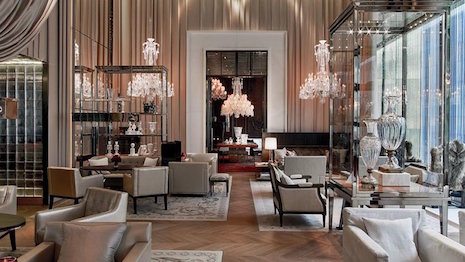 Interior of the Baccarat Hotel New York. Image credit: Baccarat Hotel New York
Interior of the Baccarat Hotel New York. Image credit: Baccarat Hotel New York
By Meaghan Corzine At the heart of Milan, you will find a five-star hotel filled with beige color, marble accents and floor-to-ceiling glass walls. The $700 to $4,000 per-night luxury “home away from home” getaway will offer you everything from gourmet meals, health services and even a personalized lifestyle manager upon booking. But this is not the site of a St. Regis, Ritz-Carlton or Four Seasons—it is an Armani Hotel. Yes, the very same Armani of haute couture, watches and shoes. It seems like a natural step for the multi-billion-dollar Italian luxury house that launched its first interior design collection almost 20 years ago. Armani has truly become a multi-faceted luxury brand over the last two decades. With its own lines for everything from furniture to florists, the hotel industry has remained one of the last uncharted territories for the lucrative brand. You can add Versace, Dior, Bulgari, Ralph Lauren and Baccarat to the growing list of luxury retail labels that are expanding into the designer hotel industry. Chanel and Diane von Furstenberg have also ventured into collaborative hospitality projects, with a Coco Chanel Suite at the Ritz Paris and a DVF design renovation at London’s Claridge’s hotel. “These partnerships enable hotels to offer something unique to their competitors with a label that has global recognition, a recognized commitment to excellence, and broad appeal,” Hermann Elger, chief operating officer of Baccarat Hotels and Resorts and managing director of Baccarat Hotel New York, told Luxury Society. “They offer the best of both worlds in their respective luxury lifestyle spaces and allow for memorable guest experiences that heighten all the senses,” he said. Experience economy Relevance—it is a word that many centuries-old high-end brands are grappling with in the age of ecommerce, Instagram, influencers and a $7 trillion global travel sector where millennials value experiences over material goods. “Travel has been transformed by the digitization of commerce more than any other industry,” Kayak and Travelocity founder Terry Jones told Forbes magazine. “In fact, online travel booking is larger than the next four categories of ecommerce combined. Because of this, the industry has moved online more than any other and it’s gone to mobile faster.” The decision for luxury brands to expand into the hospitality industry of hotels boils down to taking advantage of an already existing brand reputation. How consumers discover and interact with luxury brands can become more important than the physical products in some cases. “This is something that cannot be duplicated by luxury brands devoid of a legacy or history, and it translates into a perfectly crafted lifestyle experience for our guests,” Baccarat Hotels’ Mr. Elger said. The executive also notes that Baccarat’s sales have also been positively impacted since the opening of the New York hotel, with a nearby boutique and hotel concierge services offering private shopping sessions. The Harvard Business Review debuted the term “experience economy” in the late 1990s, predicting entertainment as a necessity for survival. Recent research from consulting firm McKinsey suggests that consumer spending on experience-related services has grown almost four times faster than spending on material goods. Soon, it may no longer be enough to carry a $3,000 purse on your arm. You need photo with a custom cocktail at a luxury fashion house café to go along with it. You can clearly see this with physical spaces – turned into viral sensations – such as The Museum of Ice Cream and Rosé Mansion, attracting hundreds of unique visitors each day who wait for tickets to the sold-out installations. The spaces are Instagram feeds come to life, and the hospitality industry is shifting toward a similar model. Unique perspective Whereas luxury travel used to be a niche sector reserved for only wealthy consumers who were in the know, luxury is now more accessible and certainly more diverse. Consumers are almost bombarded daily with an endless selection of places to sleep, eat, drink and be merry, not to mention $31 billion startup Airbnb. TO THRIVE, the hotel business is seeing that it needs a unique angle to draw in customers. It is no longer enough to be a five-star hotel. Hotels need to convince their clients why they should choose your hotel. Having already-solid reputations with wealthy consumers, luxury brands expanding into the hospitality industry is something that is not only profitable, it is logical.
 Meaghan Corzine is a writer at Luxury Society
Meaghan Corzine is a writer at Luxury Society
